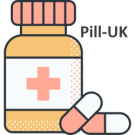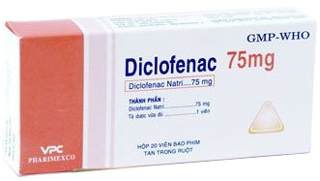Where to buy Diclofenac in United Kingdom
The medicine can be purchased at any pharmacy (where all medicines are sold on prescription). However, we recommend that you order Diclofenac in our online pharmacy because you will get a number of advantages: convenience, the possibility to order the drug without a prescription and, at the same time, the best price and complete confidentiality. Are you interested? Then do not miss the opportunity to make one of the most useful purchases.
Diclofenac Without Prescription Online Pharmacy
In our pharmacy you can easily order Diclofenac without prescription. How? Simply attach your doctor’s prescription to your order. We trust you and that is why we give you this opportunity. You are only a few days away from receiving the required medicine.
Affordable Product Price
Affordable price is what your wallet and your bank account will be happy about. And we are ready to provide it to you in our pharmacy. How do we manage to sell drugs so cheaply? It’s a question of efficiency and thrift. We supply medicines directly from the warehouses of our pharmaceutical partners, without having to spend money on renting warehouse premises, pharmacies and other related expenses. This allows us to offer you advantageous prices, additional discounts and bonuses.
Anonymity
One of the main rules is the confidentiality of our customers’ data. You can order a medicine anonymously and pay for it cash on delivery, in complete security. At the same time, we guarantee fast delivery anywhere in the country.
What Is Diclofenac
Indications For Use Diclofenac
Topical treatment of pain and inflammation of joints, muscles, ligaments and tendons of rheumatic or traumatic origin.
Inflammatory and degenerative forms of rheumatic diseases (rheumatoid arthritis, ankylosing spondylitis, osteoarthritis, spondyloarthritis). Spinal pain syndrome. Non-articular rheumatism. acute attacks of gout Post-traumatic and post-operative pain syndrome with inflammation and swelling, e.g. after dental and orthopaedic surgery. Gynaecological diseases accompanied by pain and inflammation, e.g. primary dysmenorrhoea or adnexitis. As an adjuvant in severe painful inflammatory diseases of the ENT organs, e.g. pharyngotonsillitis, otitis media. According to general therapeutic principles, the underlying disease should be treated with basal therapy. Fever alone is not an indication.
Contraindications to the use of Diclofenac
Hypersensitivity to diclofenac or to other components of the medicinal product. History of bronchial asthma, urticaria or acute rhinitis due to administration of acetylsalicylic acid or other non-steroidal anti-inflammatory drugs.
Find out all about Feldene and its active ingredient in our pharmacy.
Side effects
Hypersensitivity to the active substance or to any other component of the medicine. Diclofenac-Darnica, like other NSAIDs, is contraindicated in patients presenting with attacks of AD, acute urticaria or rhinitis, nasal polyps or other allergic symptoms in response to the use of acetylsalicylic acid or other NSAIDs. III trimester of pregnancy. Acute gastric or intestinal ulcer; gastrointestinal bleeding or perforation. Inflammatory bowel disease (Crohn’s disease or ulcerative colitis). Severe liver failure (Child-Pugh class C, cirrhosis or ascites). Severe renal insufficiency (creatinine clearance < 30 ml/min). Congestive heart failure (NYHA II-IV). Coronary heart disease in patients with angina pectoris, previous myocardial infarction. Cerebrovascular disease in patients who have suffered a stroke or have episodes of transient ischaemic attack. Peripheral arterial disease.
Postoperative pain management after coronary artery bypass surgery (or use of cardiopulmonary bypass). History of gastrointestinal bleeding or perforation associated with previous NSAID therapy. Active peptic ulcer/bleeding or history of recurrent peptic ulcer/bleeding (two or more separate episodes of ulcer or established bleeding).
Use
Oral administration, tablets should be swallowed without chewing, after a meal with plenty of water. The medicinal product should be administered in the smallest and most effective dose for the shortest possible time, taking into account the treatment goals of the individual patient. Adults.
The initial dose is usually 100-150 mg/day. In case of reduced symptoms and also in case of prolonged therapy, a dose of 75-100 mg/day is sufficient. The daily dose should be divided into 2-3 doses. To avoid night pain or morning stiffness, treatment with the drug can be supplemented by administration of rectal suppositories containing diclofenac before bedtime.
The daily dose should not exceed 150 mg.
Children. Tablets at a dose of 25 mg may be administered to children from 8 years of age (with a body mass of at least 25 kg) up to 18 years of age on prescription at a dose of 0.5-2 mg/kg body weight, depending on the severity of symptoms: this dose should be divided into 2-3 administrations.
Frequently Asked Questions
How many times a day is Diclofenac usually taken?
The daily dose of Diclofenac is usually divided into 2 or 3 doses. However, it is advisable to follow your doctor’s instructions. The dose of medicine needed may be different from the recommended dose.
When Diclofenac takes effect
The tablets take effect one to two hours after they are taken.
How Many Days Should It Be Taken?
Treatment usually does not last more than 14 days. Take the tablets as directed by your doctor.


